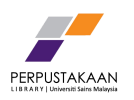- About Us
- How to use the library
- Academic & Research Support
- Library and The Community
Research Visibility
-
A researcher profile is a professional profile of researcher which showcase the activities related to the research such as publication productivity, conferences, collaborative projects, teaching commitments, fieldwork, and data collection. A researcher profile will connect you and your research and make your scholarship highly discoverable through many different platforms and systems, as well as help users reach author-specific information more quickly and effectively.
Among the advantages of the researcher profile are:
- Will make your work discoverable by others
- Connects your research to you throughout your career, no matter how your name appears in the publication
- Distinguishes you from other researchers with similar names
- Minimizes the time you spend filling out forms when submitting research or applying for grants;
- Is being required by major journal publishers and funders.
Researcher Profile Platforms:
- ORCID ID (Open Researcher & Contributor ID)
It is a non-profit organization supported by a global community of organizational members, including research organizations, publishers, funders, professional associations, and other stakeholders in the research ecosystem. An open, non-profit, community-based effort to create and maintain a registry of unique researcher identifiers. The ORCID Registry is available free of charge to individuals, who may obtain an ORCID, manage their record of activities, and search for others in the Registry. Researchers can import their existing publications indexed in Web of Science, Scopus, Google Scholar, and others, to their ORCID ID. - Publons/ResearcherID (Web of Science)
Your publications listed in the Web of Science database are added to your profile – thus ensuring accuracy in tracking your publication history and making it faster to track how your work is cited. Create and manage a professional profile, build an online publication list, measure performance with cited counts and h-index. -
Scopus Author ID
You do not need to register for a Scopus Author ID; because if you have a paper indexed in the database, you are automatically assigned a Scopus Author ID. If you have multiple duplicate profiles in Scopus, merge your profiles via Author Feedback Wizard - Google Scholar ID
Creating a Google Scholar profile will make sure that Google Scholar will easily and accurately group all the citations of your publications into one pool. Click on My Citations to set up an account and collect all your publications into your account. (make sure you have a google account)
Feel free to browse this slide to learn more about researcher profile:
-
What is bibiliometrics?
Bibliometrics are a variety of statistical measures used to examine publication data.
Bibliometric examination can be applied to an author, article, journal, researcher group or an institution and ought to continuously be utilized mindfully.
Citation databases (Scopus, Web of Science) aggregate citation data using them to create citation metrics. A concept of ‘research impact’ is based on the premise the subsequent citation of research demonstrates quality.
The measurements used in international university rankings include bibliometrics. -
What is Almetrics?
Altmetrics stands for "alternative metrics." The "alternative" part references traditional measurements of academic success such as citation counts, journal prestige (impact factor), and author H-index. Altmetrics are meant to complement, not totally replace, these traditional measures.
Examples of Altmetrics include: mentions on Facebook, Twitter, or online news sites. exports to citation management systems like Mendeley or Zotero. downloads (of full text articles, software, et
Note:
If you need special training or consultation on this topic, please contact us via

Disclaimer
USM Library will not be responsible for any loss or damage caused by the use of any information obtained from this website.
Universiti Sains Malaysia Library © 2023
All Rights Reserved
- Last Modified: Friday 20 February 2026.
